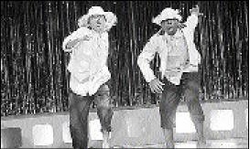Dance champs 'sweeping' culture into spotlight
Published: Sunday | July 19, 2009

Anthony Minott/Freelance Photographer
Untouchable Squad - Manawe Simpson (left) and Jerome Brown - doing traditional dance moves during last year's 'Dancin' Dynamites' competition.
Sadeke Brooks, Staff Reporter
Unlike many other dance competitions, the World Reggae Dance Championships only has dance moves that originate out of Jamaica.
"It is the Jamaican reggae dance that we are promoting and not dances from other countries. Just our culture," said Juliet Cowan, coordinator of the competition, which is done by the Jamaica Cultural Development Commission (JCDC).
She said during the initial stages of the competition, which started in 2006, many of the contestants came with foreign content in their choreography. However, this is slowly changing and there are now more dancers with local dance moves.
Competition judge Kadeen Henry said displaying the Jamaican culture through dance is a priority of the competition.
"One of the main differences is that we focus directly on reggae and dancehall. We are not looking for any form of hip hop or breakdancing. You have folk dances but mainly dancehall, a bit of kumina. But it is just indigenous Jamaican dance moves," Henry told The Sunday Gleaner.
"Most of them are coming straight from the streets without any formal training. Most of the choreography could be tighter because it seems more like individuals dancing together rather than a group performing."
Elimination rounds
That is where the workshops come in. At the workshops, the 20 groups, which are chosen in the elimination round, are shown how to improve their routines for the finals. They are given sessions in choreography, presentation and use of stage.
Three elimination rounds were held in Portland, Clarendon and St James, while the last will be held at the Ranny Williams Entertainment Centre tomorrow.
Cowan said she has noticed that there is a higher quality of dancers entering the competition.
"We have seen better quality dancers. The standard has been much higher. From the elimination, what we have seen is an improvement over 2006. We are getting reggae dancers now," Cowan said.
Manawe Simpson, member of Untouchable Squad, which was last year's winning group, said he likes the reggae element of the competition. In addition, he gained a lot from the competition.
"It has opened a lot doors for me. We got work because of it at Fisherman's Regatta and the Prime Minister's Youth Award," said Simpson, who also entered the competition in 2007, where his group placed third.
This is not the first competition that Untouchable Squad is entering as it placed sixth in 'Dancin' Dynamites' last year and also entered the Tastee Talent Trail.
Simpson added: "It is gaining popularity among young dancers. I am hearing of more people entering the competition."
Cowan said there has been increased interest and that information about the competition can be accessed from the JCDC's website. In addition, she said flyers are distributed and promotions are done at dancehall events, schools and community groups by the JCDC.
But this promotion does not seem to be enough, according to Henry.
"The energy that I see they (JCDC) put behind the other competitions, I don't see it behind this one," she said.
Henry said the advertising can be significantly improved to bring out a fresher, more youthful crop of dancers. She said the JCDC should try to advertise on cable stations, as well, because the youth tend to watch these stations more.
Publicity
Like Henry, Simpson also believes that more could be done to promote the competition.
"I don't think it is as publicised as other competitions. In years gone by, people didn't even know where the competition was," he told The Sunday Gleaner, while noting that he had to call the JCDC to get information about the competition when he decided to enter.
Nonetheless, Cowan is expecting an audience of about 10,000 people at this year's final, which will be held at the Ranny Williams Entertainment Centre on August 1. There, the finalists will compete for $1 million in cash and prizes. The winner will receive $200,000, second place will receive $100,000 and the third place will get $50,000.
At the show, there will also be performances from Wayne Marshall, D'Angel, Christopher Martin, Romain Virgo and Shane-O.
Strange Jah Cole's Bangarang is strikingly lyrically sparse, as there is a single vocal line and saxophonist Lester Sterling carries the lead throughout most of the song.
It is not, however, the only case where less equals more in Jamaican music.
In February 2006, during the annual Bob Marley lecture held at the Social Sciences Lecture Theatre, UWI, Mona, the discussion turned to Don Drummond. Ibo Cooper, lecturer at the Edna Manley College of the Visual and Performing Arts and former member of Third World band, played a piece of music on the keyboard with both hands.
Then he played a part of Eastern Standard Time, using only one finger for the two notes in the phrase.
"Don Drummond achieved a musician's dream," Cooper said, emphasising the simplicity, yet effectiveness, of the music.
A single vocal phrase is often used in dub versions of popular songs, as well as songs that are conceived as dub in the first place. So when the Dubtonic Kru band plays Black Uhuru's Shine Eye Gal, the sole vocal line is "shine eye gal is a trouble to a man", the rest of the song being drum and bass.
Two dancehall songs emphasise the use of a few words over and over, the additional lyrics serving to add just a little variety and, ultimately, emphasise the phrase.
One is Little Vicious' mid-90s Inna Di Ghetto, which runs through a number of persons and things that are in the ghetto.
Then there is the then Lexxus' 2000 song Full Hundred, which promises extreme effort and huge accomplishments while boasting of the capability to give the "full hundred".























